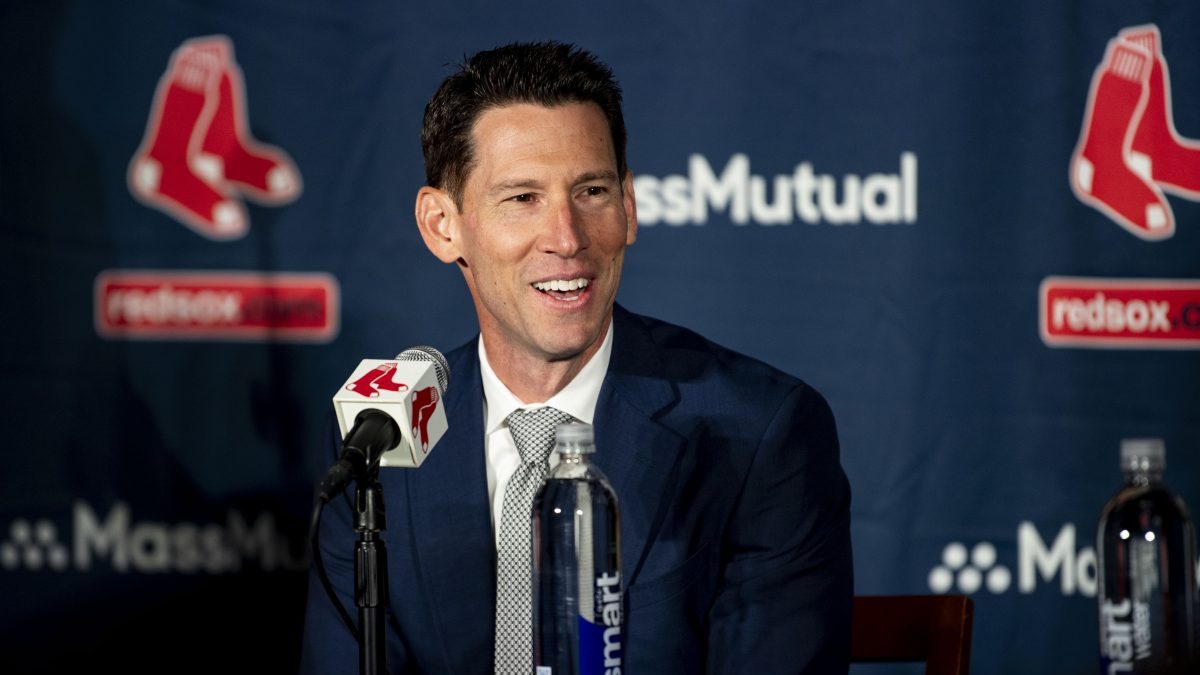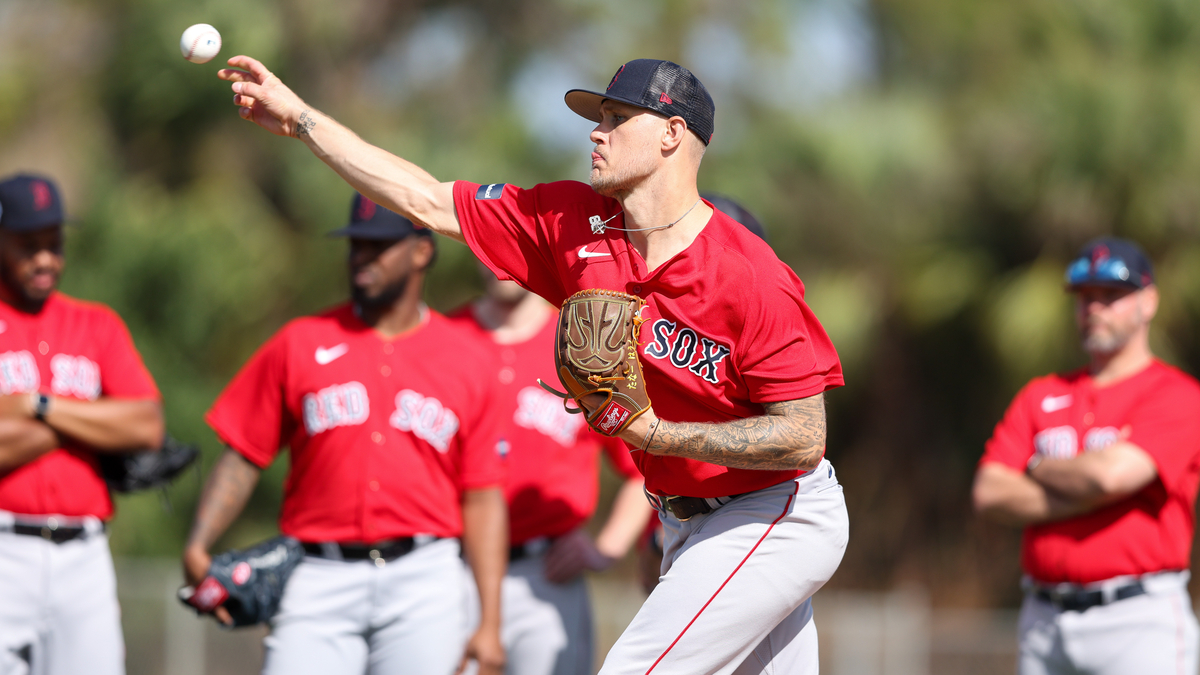Craig Breslow is a nerd. He admits it. But there's a distinction between the Yale grad and virtually every other Ivy Leaguer running a baseball team – he's not just a nerd.
He's a jock, too. Yes, he let us play -IZE bingo during his jargonized introductory press conference, in which he never saw a piece of data he couldn't maximize, optimize, or synthesize, but if you read between the McKinsey buzzwords, there was plenty of jock in there, too, and that's where I'd suggest Red Sox fans focus their hope on his tenure as the team's new chief baseball officer.
Breslow spent 13 years in the big leagues, and that makes him a jock, even if he didn't sound like one on Thursday. Thankfully, we're here to help with simple English translations that highlight how different Breslow's tenure should be from skittish predecessor Chaim Bloom.
Stay in the game with the latest updates on your beloved Boston sports teams! Sign up here for our All Access Daily newsletter.
1. "Part of building a consistent winner at the major league level is making a lot of bold, difficult decisions, and some of those include favorite players."
Breslow made it clear in his opening statement that he will be a man of action, and that's the most welcome change of all. Whereas Bloom consistently positioned himself to fall just short of pretty much every player of substance he pursued -- or in the case of the last two trade deadlines, to be paralyzed into virtual inaction -- one of the only areas where Breslow used direct language was in his willingness to act.
There's little question that ownership -- particularly chairman Tom Werner -- had grown tired of Bloom's wishy-washiness. Athletes are doers by nature. Had Breslow passively accepted his lot in life after being released by the Brewers, he never would've reached the big leagues. Instead, he fought his way from independent ball to a chance with the Padres, and he didn't just hang around. He was effective for more than a decade, winning a World Series in 2013.
MORE PATRIOTS COVERAGE
2. "Leveraging prospect capital."
He's going to trade prospects! One of the most consistent criticisms of Bloom is that he considered even the most mediocre minor leaguers untouchable, preferring the potential of every youngster over the relative certainty of the big leaguer he could acquire. He made one notable exception, sending right-hander Aldo Ramirez to the Nationals for Kyle Schwarber, and that paid off handsomely.
Breslow recognizes that prospects can also be "leveraged" in trades, a concept Dave Dombrowski took to the extreme. There's a happy medium between torching the farm and hoarding every last draftee, and don't be surprised if Breslow finds it.
3. "Attrition can be good … we're also limiting redundancy and narrowing gaps where we can."
Translation: "I'm gonna fire people."
There's a sense within the industry that the Red Sox front office has become bloated, between the startling number of holdovers who date back to Theo Epstein's tenure, to the rapid expansion of the analytics department to include more than 30 people.
Breslow sat in front of a room full of coworkers who had just applauded his arrival and effectively announced that change is coming, which is pretty ballsy when you think about it. I wouldn't expect him to go Henry VIII immediately, but once he gets the lay of the land, I suspect he will see the value of turnover.
4. "I think over time, the right profile, the right thought partner will avail itself, but currently I'm not feeling any rush to do that."
The obvious move from a continuity standpoint would be simply to promote Eddie Romero to general manager, as Bloom did with long-time exec Brian O'Halloran, and Dombrowski did before him with Mike Hazen.
That Breslow did not take this "obvious" step with one of the other finalists for his job suggests that he recognizes the need for new voices atop the baseball operations. Whether he seeks a second-in-command from outside the organization remains to be seen, but he certainly signaled this possibility.
5. "The idea of deploying our players in a way that maximizes positive outcomes by creating the most favorable matchups we can is a term that I would call optimization."
First of all, ugh. That is quite a sentence. Second of all, he's admitting up front that he'll have a say in constructing the lineup, and I'd much prefer an executive who owns it than one who pays lip service to the separation of church and state, which no longer exists in any dugout now that Houston's Dusty Baker has retired.
(As an aside, I've never really understood the idea that front offices should leave the X's and O's entirely to the manager. Whether we like it or not, there's now a bleep-ton of information at their disposal. An ex-player like Breslow, especially, should be able to discuss it with manager Alex Cora without anyone feeling threatened.)
6. "Given the size of today's offices, given the ubiquity of information available, it's really easy to get caught up in trying to find the newest, the brightest, the most current information, when it turns out that getting an organization directionally aligned behind something is far more powerful."
Boiled down, this might be my favorite Breslow quote of the day. Under Bloom, the Red Sox seemed determined to unearth diamonds at the expense of perfectly good granite and marble. It led them to a staggering number of pitchers with 7.00 ERAs but intriguing numbers "under the hood," some of whom panned out, but most who didn't.
What Breslow is saying is that there's no need to reinvent the game. There's more than enough data to build a winner without discovering the next marginal metric. What's much more important is a cohesive vision, and here's my early take on Breslow's:
The best organizations develop pitching, the big-league roster takes precedence over the farm, and when there's a bold move to be made, don't be afraid to act, even if it costs money.
Strip away the robotic corporate jargon, and that's actually a mission statement I can get behind.



